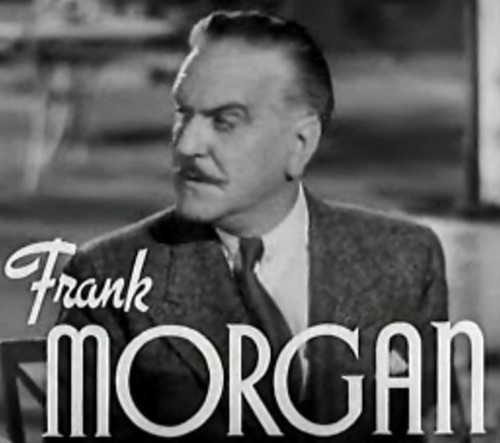In 1938, Frank Morgan was one of Hollywood’s “featured players,” that is, an actor who was not a major star in terms of box office draw and revenue, but was a reliable and competent performer who was an audience favorite. Morgan was born Francis Phillip Wuppermann on June 1, 1890, in New York City. Morgan was known in his youth as one of the best boy sopranos in town, singing in the choirs of St. Thomas and All Angels churches. He attended Cornell University but dropped out to pursue sundry and itinerate careers as a brush salesman, advertising man, real estate agent, and cowpuncher.
Eventually, Frank determined to emulate the career of his older brother Ralph, who had adjusted his last name to Morgan and made a reputation for himself as an actor in live theatre. Frank also adopted the surname Morgan and made his vaudeville debut in a sketch written by his friend Edgar Allan Woolf—who would eventually go on to co-write the screenplay for The Wizard of Oz. Frank Morgan went on to accumulate impressive stage credits in New York. With his debonair good looks and theatrical background, Morgan was a natural to transition into silent films in 1916. With the introduction of “talkies,” Morgan continued to build a steady film career that even included a 1934 Academy Award nomination. Morgan progressed to roles that earned him the nickname “the absent-minded professor of the screen.”
As early as January 31, 1938, associate producer Arthur Freed had drafted a prospective list of actors that might be cast in a future production of The Wizard of Oz, although the story had not yet been acquired by the studio. For the Wizard, Freed suggested Frank Morgan. (Arthur Freed shadowed producer Mervyn LeRoy as an uncredited apprentice on The Wizard of Oz, and took the lead—pending LeRoy’s approval—on casting and story and song development.) But after the screen rights to The Wizard of Oz were secured by the studio, a litany of other actors was considered for the part of the humbug magician.
Fussbudget comedian Ed Wynn was Mervyn LeRoy’s personal preference for the part. Wynn might very well have captured the Wizard’s fumbling, bumbling persona, and mock bravura, but he declined the part. The next popular selection within LeRoy’s production unit became W.C. Fields, and it was widely reported that he was cast as the Wizard. In reality, Fields was intrigued enough to annotate a copy of the Oz script with ad-libs but when the studio counteroffered $75,000 to his $100,000 asking price, Fields opted out. After other character actors were reviewed, Frank Morgan won the role on the strength of a hilarious audition.
Eventually, the Wizard part was expanded to include his ancillary alter egos: Professor Marvel, the traveling Kansas fortune teller; the Guardian of the Gates (“Well, bust my buttons! That’s a horse of a different color!”); the Cockney cabby who steers the Emerald City coach; the sentry who guards the Wizard’s palace; and the voice of the Wizard’s monstrous, disembodied head (the face was that of an anonymous actor in heavy make-up, lip-synching to Morgan’s dialogue).
Frank Morgan died in his sleep at age 59 on September 18, 1949, just as The Wizard of Oz was enjoying a smashing success in its first theatrical re-release. It has been falsely reported that none of Morgan’s obituaries made mention of his part in The Wizard of Oz. Indeed, the death notice published in countless newspapers by the Associated Press listed Oz as one of just four of his memorable and enduring screen accomplishments. Frank Morgan will forever be remembered as the Wizard of Oz, a conman and huckster with a heart of gold.

